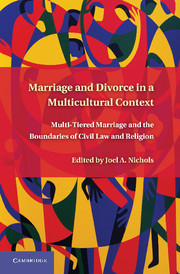 Marriage and Divorce in a Multi-Cultural Context
Marriage and Divorce in a Multi-Cultural Context From Multiculturalism to Multi-Conjugalism?
Published online by Cambridge University Press: 05 November 2011
The “Canadian school” of social and political theory has been at the forefront of theoretical reflection on the problem of multicultural diversity. These theoretical contributions, some claim, have built on Canada’s proven political capacity to accommodate deep diversity. Canada was the first nation in the world to adopt multiculturalism as its official state policy, a landmark venture that was wedded to an equally strong commitment to the modern rights revolution. The historic 1982 constitutional act that established the Canadian Charter of Rights and Freedoms also entrenched multiculturalism, gender equality, aboriginal rights, and bilingualism – as well as reaffirming confessional educational rights of Catholics and Protestant minority communities. This is a classic Canadian constitutional mix.
How does marriage fare in this land of multiculturalism, rights, and deep diversity? Canadian couples dwell in a complex array of political intersections, cultural fissures, and ideological divides when it comes to questions of gender, sexual orientation, and conjugality. In the last decade, Canada has been at the forefront of a number of innovative developments in the domain of conjugality. After a relatively tame public debate, Canada redefined marriage to include gay and lesbian couples. Canadian courts and legislatures have been advancing our constitutional commitments to gender equality in areas of conflict between civil and religious family law. Moreover, Canadian and provincial governments have launched a public debate over the question of decriminalizing polygamy. By 2003, Canada’s growing “boldness in social matters” was earning it a “rather cool” rating from global public pundits. It remains an open question, however, whether these developments have uniformly caused gains in advancing Canadian commitments to deep diversity in the domain of conjugality.
To save this book to your Kindle, first ensure no-reply@cambridge.org is added to your Approved Personal Document E-mail List under your Personal Document Settings on the Manage Your Content and Devices page of your Amazon account. Then enter the ‘name’ part of your Kindle email address below. Find out more about saving to your Kindle.
Note you can select to save to either the @free.kindle.com or @kindle.com variations. ‘@free.kindle.com’ emails are free but can only be saved to your device when it is connected to wi-fi. ‘@kindle.com’ emails can be delivered even when you are not connected to wi-fi, but note that service fees apply.
Find out more about the Kindle Personal Document Service.
To save content items to your account, please confirm that you agree to abide by our usage policies. If this is the first time you use this feature, you will be asked to authorise Cambridge Core to connect with your account. Find out more about saving content to Dropbox.
To save content items to your account, please confirm that you agree to abide by our usage policies. If this is the first time you use this feature, you will be asked to authorise Cambridge Core to connect with your account. Find out more about saving content to Google Drive.